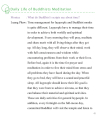spiritual teaching : ค้นหาหนังสือธรรมะ หน้า 3 / 13
หน้าหนังสือทั้งหมด

129
The Formation of Habits and Teaching Morality
Suzanne Jeffrey
which will lead to destructive thoughts and eventually into darkness. So, as we can see,
different habits lead to different lives. All of our habits come from our early training.
“Ho
This text discusses how habits develop from early training and repeated actions, and emphasizes that both good and bad habits influence our lives. It highlights the need for teachers to first correct

61
Dhammakaya Foundation's Educational Media
Cassettes
For the convenience in spreading Dhamma to youth around the country, Dhammakaya Foundation has produced video and audio cassette teaching materials on subjects including meditation instructi
The Dhammakaya Foundation produces a range of video and audio teaching materials, including meditation instructions, Dhamma music, and chantings to engage youth across Thailand. It operates 10 daily r

71
Growth of Dhammakaya Foundation's Global Influence
ROM QUALITY GREW QUANTITY
The reputation for training offered by the Dhammakaya Foundation has spread primarily by word of mouth, increasing the popularity of activities held, as the years pass by. P
The Dhammakaya Foundation's dedication to meditation training has led to a significant reputation, expanding through word of mouth and enhancing lives. Local branches in Thailand and abroad facilitate

6
The Charismatic Teachings of Luang Por
Here is the extracted text from the image:
Foreword
In an attempt to give an insight into the charismatic approach and character of Luang Por, when confronted challenged by a question, even a questio
This text highlights Luang Por's charismatic teaching style, characterized by engaging, personal anecdotes and direct communication. He emphasizes the importance of understanding one's own learning be

34
The Universal Love of the Lord Buddha
personal interest. It is the kind of love that the Lord
Buddha had after his enlightenment. Although he had
accompanied Princess Bimba for many lifetimes to
pursue Perfections, he could finally make a
The text reflects on the profound love exemplified by the Lord Buddha following his enlightenment. He released personal affections to pursue spiritual ordination and achieved enlightenment, marking th

50
Raising Children: Fostering Wisdom and Respect
Part Two: Raising Children
will develop a habit of sluggishness and indolence.
In this case, we will be raising baby pigs!
• When we feed our children on a schedule, they will
develop a habit of punct
Part Two discusses the importance of teaching children punctuality, respect, and wisdom through consistent habits. It highlights the difference between worldly wisdom and inner wisdom, emphasizing tha

63
Training Programme and Dhamma Teaching to the Public
Training Programme and Dhamma Teaching to the Public
ince the beginning of building Wat Phra Dhammakaya, the duty in building the temple was heavy, but one that Luang Phaw Dhammajayo gave as being th
Since its inception, Wat Phra Dhammakaya has prioritized Dhamma training alongside temple construction. Luang Phaw Dhammajayo emphasizes the significance of teaching Dhamma to the public through vario

83
Understanding Dhammakāya in Theravāda Buddhism
In a few passages, however, Sāriputta also refers to the term dhammakāya in the sense of the Buddha’s teaching.150
On the whole, traditional Theravādins interpret the term dhammakāya mostly in the se
This passage examines the term 'dhammakāya' as interpreted in traditional Theravāda Buddhism. It discusses the general view of dhammakāya as reflecting the qualities of the Buddha and the spiritual re

5
Understanding Dhamma Through the Teachings of Luang Por Dattajevedo
This book is a translation into English of a lecture given by a Most Venerable Thai monk in his native tongue. In order to convey the content accurately and understandably to an international readersh
This book presents an English translation of a lecture by Luang Por Dattajevedo, a respected Thai monk, emphasizing the importance of ethical learning and teaching in understanding Dhamma. His charism

29
Training the Trainer: Defining a Good Trainer
CHAPTER 3
TRAINING THE TRAINER
DEFINING A GOOD TRAINER
To teach to a high standard requires a sound knowledge of the body, the mind, kilesa and baap as previously defined. From this basis teachers ar
บทที่ 3 ลงลึกในความสำคัญของการฝึกอบรมครู เพื่อสร้างแบบอย่างที่ดีในการสอน ความรู้เกี่ยวกับร่างกายและจิตใจเป็นพื้นฐานสำคัญ ผู้ที่เป็นครูที่สมบูรณ์จะต้องเป็นแบบอย่างที่ดีในด้านคุณธรรมและจริยธรรม โดยสามาร

47
Teaching Your Unborn Child: The Spiritual Aspect of Conception
Being born a human requires not only the combination of the father's sperm and the mother's egg, but also the spiritual conception of the child in the womb. The tiny being can only begin life in the m
Being born requires the combination of sperm and egg alongside spiritual factors. Good parents can influence a child's positive reception in the womb. Preparation should start before pregnancy, focusi

156
Purification of the Mind: A Path to Enlightenment
3. Purify the mind: Keep one's mind bright and clear all the time, while inhaling and exhaling. If a person inhales and does not exhale, that person's life will come to an end. Death bears no sign of
This text emphasizes the importance of maintaining a clear and bright mind through inhalation and exhalation. It explains how a person's mental state can determine their spiritual fate in the afterlif

63
Understanding Paccekabuddhas in Buddhist Philosophy
V. Reference 2: Dhammakāya and Paccekabuddhas
A Paccekabuddha is counted as one of the two types of Buddhas. According to Buddhist philosophy, a Paccekabuddha is a person who is of the highest wisdom
This text discusses the concept of Paccekabuddhas, individuals of high wisdom who achieve self-enlightenment but lack the ability to teach. It explores scholarly arguments about the pre-Buddhist origi

78
Understanding Dhammakāya in Early Theravādin Context
The research approach employed in the present study is intended as a more direct, analytical and inclusive one than previous approaches to this question. It is more direct in that it set off by docume
This study analyzes the term dhammakāya through close readings of Pali canonical passages, revealing that it relates not only to the Buddha but also to other noble figures like Paccakabuddhas and disc

28
The Journey to Understanding Suffering and Spirituality
Suzanne Jeffrey
Him with everything to meet His needs, but this was simply not enough for him to answer his true human need. And what were those needs? Well, one day, while He was still a Prince, He
In this text, the journey of an individual exploring the teachings of Buddhism and their relationship with Christian beliefs is shared. Through the lens of the Buddha's discovery of suffering and the

113
Buddhist Meditation and Spiritual Activities
The image contains three pictures, each depicting people involved in religious or spiritual activities, probably in a Buddhist setting. The text content is not visible or is not the primary focus, but
This content showcases three images capturing the essence of Buddhist spiritual practices. The top image features a monk leading meditation on a raised platform, guiding a group seated on mats in a tr

42
Kala, Anathapindika's Son
3
KALA, ANATHAPINDIKA'S SON
This instruction was given by the Teacher while he was in residence at Jetavana with reference to Kala, son of Anathapindika.
Tradition has it that Kala, although the s
This teaching illustrates the challenges faced by Kala, son of the wealthy Anathapindika, who remains indifferent to his father's guidance and the teachings of the Buddha. Despite his father's attempt

20
Superior Love through Superior Dhamma
Superior Love
through Superior Dhamma
Because we are human beings, none of us are perfect.
We all come with a baggage of deficiencies. We can
cope with our own deficiencies but we cannot
tolerate some
This text discusses the challenges of living with a partner and how the Dhamma provides guidance for a harmonious family life. It highlights the four virtues: truthfulness, self-control, endurance, an

26
Unbreakable Bonds: The Eternal Connection of Family
Unbreakable Bonds
The bond between a husband and wife can be broken;
but the bond between parents and children is
unbreakable even through death. Even if we do not
know who our parents are (due to cer
The bond between parents and children remains unbreakable even through death. While some may show their love occasionally, expressions of gratitude should be more frequent. The Lord Buddha exemplified

43
Daily Life of Buddhists and Meditation Practices
Daily Life of Buddhists Meditation
Monica
: What do Buddhist's scripts say about time?
Luang Phaw: Time management for laypeople and Buddhist monks
is quite different. Laypeople have to manage their t
In Buddhism, time management differs for laypeople and monks. While both seek spiritual growth, laypeople balance everyday life with meditation, prayers, and mindfulness. Morning routines include pray
